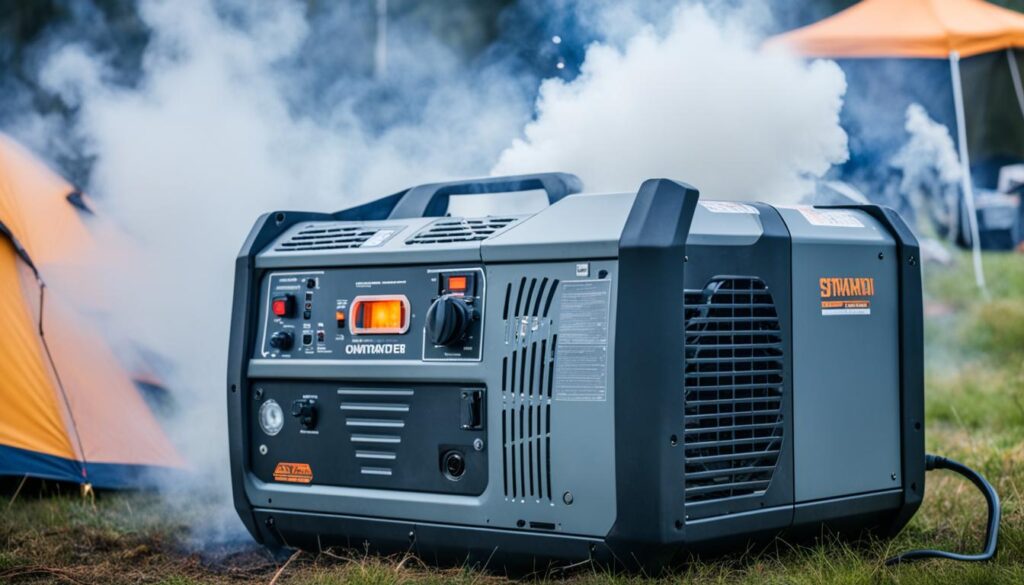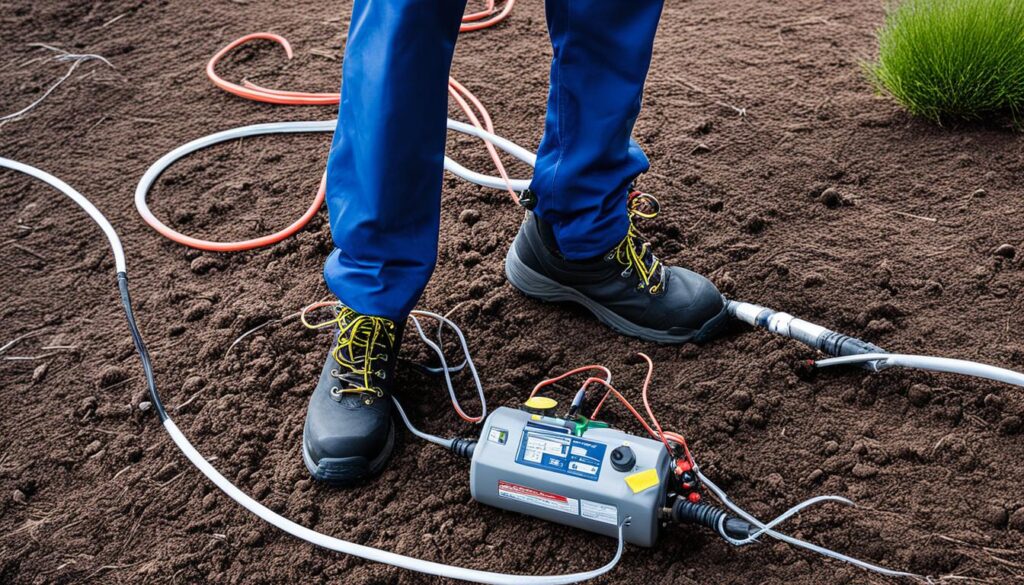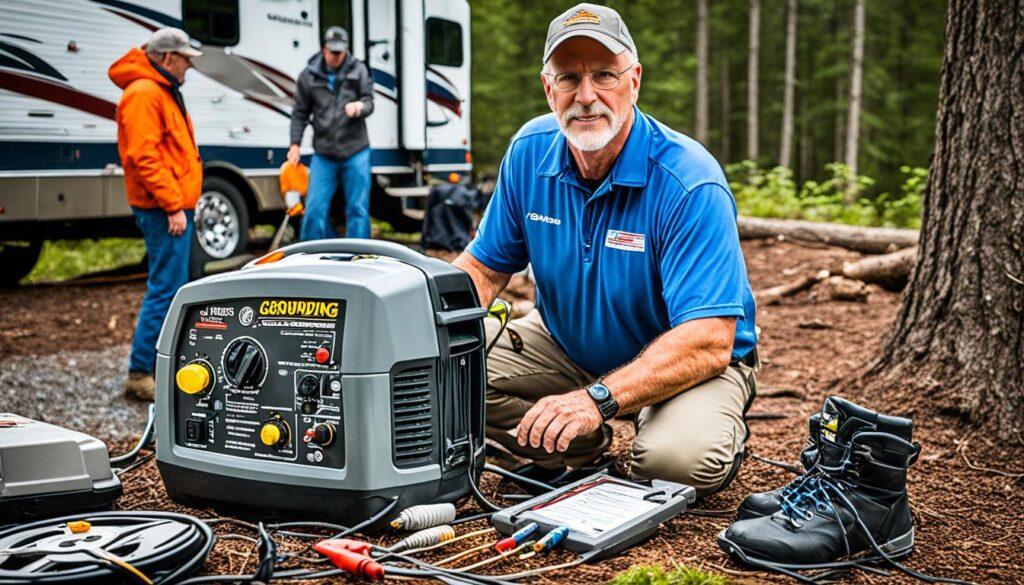A properly grounded generator is essential for ensuring the safety of yourself, your family, and your equipment. Grounding involves connecting the generator’s neutral electric conductor terminal to the ground using a low-resistance copper grounding wire. This prevents dangerous electric shocks, overloading of the generator, and potential damage to appliances. While not all generators require grounding, it is necessary if you’re connecting your generator to an electrical panel or building electrical system. Failure to ground a generator can lead to electrocution, equipment damage, electrical overload, or even an explosion in extreme cases.
Key Takeaways:
- Properly grounding your generator is vital for safety during camping trips.
- Grounding prevents electric shocks, overloading, and potential damage to appliances.
- Generators connected to electrical panels or building systems require grounding.
- Not grounding a generator can lead to electrocution, equipment damage, and explosions.
- Follow manufacturer recommendations and legal requirements for generator grounding.
Contents
- 1 Importance of Generator Grounding
- 2 Do All Generators Need to Be Grounded?
- 3 What Happens If You Don't Ground a Generator?
- 4 Steps to Ground Your Generator Safely
- 5 Contact an Expert for Generator Grounding Advice
- 6 Understanding Electrical Grounding Basics
- 7 Grounding a Generator When Camping: Legal and Manufacturer Guidelines
- 8 FAQ
- 9 Source Links
Importance of Generator Grounding
Grounding plays a crucial role in ensuring the safe operation of electrical systems, including generators. By providing a path for faulty electricity to flow safely into the ground, grounding prevents electric shocks and equipment damage. It is a fundamental safety measure that cannot be overlooked when using a generator, especially during camping trips.
One of the primary benefits of grounding a generator is the protection it offers against electrical overload. When excess electricity is not properly diverted, it can overload the system and cause significant damage to the generator and connected appliances. Grounding ensures that any excess electricity is safely dissipated, preventing costly repairs and potential hazards.
Grounding also helps prevent fires and explosions that can occur when stray electricity comes into contact with the fuel tank. By providing a designated path for electrical faults to follow, grounding effectively isolates any potential source of ignition, reducing the risk of fire or explosion.
Furthermore, grounding a generator is not merely a best practice—it is a requirement mandated by electrical codes and standards. These regulations are put in place to ensure the safe and reliable operation of generators in various applications. Adhering to these guidelines not only promotes safety but also helps avoid legal and regulatory issues.
To visually illustrate the importance of generator grounding, here is a table comparing the benefits and potential risks of grounding a generator:
| Benefits of Grounding a Generator | Potential Risks of Not Grounding a Generator |
|---|---|
| Prevents electric shocks | Elevated risk of electrocution |
| Protects against equipment damage | Increased likelihood of generator or appliance failure |
| Mitigates the risk of electrical overload | Greater chance of overloading the generator or electrical system |
| Reduces the risk of fires and explosions | Higher potential for fires or explosions due to stray electricity |
As the table demonstrates, grounding a generator is a critical step in maintaining a safe camping environment. It protects both campers and equipment from potentially hazardous situations, ensuring a worry-free camping experience.
To further underline the importance of generator grounding, here is an illustrative quote:
“Proper grounding of generators is paramount for camper safety. It provides a reliable pathway for faulty electricity, preventing accidents and damage to valuable equipment. Neglecting generator grounding can have severe consequences, compromising the safety of campers and potentially leading to costly repairs or even tragedy.”
By understanding the importance of generator grounding and implementing the necessary measures, campers can enjoy their camping trips with peace of mind, knowing that they are safeguarded against electrical hazards.
Do All Generators Need to Be Grounded?
When it comes to generator grounding, the requirements can vary depending on the application. While not all generators need to be grounded, it is essential to understand the specific grounding requirements for your generator to ensure safe operation.
If you’re using a generator solely with extension cords, grounding may not be necessary. However, if you plan on connecting your generator to an electrical panel or building electrical system, grounding becomes mandatory to prevent potential hazards.
Modern portable generators often come pre-grounded to their metal frame, eliminating the need for manual grounding. However, some generators may still require manual grounding using a grounding rod. It is crucial to consult the manufacturer’s recommendations for your specific generator model to determine the grounding requirements.
When camping with a portable generator, it is important to assess the need for grounding based on your setup. Below is a table that summarizes the grounding requirements for generators:
| Generator Setup | Grounding Requirement |
|---|---|
| Generator used exclusively with extension cords | No grounding required |
| Generator connected to an electrical panel or building electrical system | Grounding is mandatory |
Remember, safety should always be the top priority when operating a generator. Adhering to the recommended grounding requirements ensures the safe and reliable use of your generator during camping trips.
Quote:
“Proper grounding is crucial for preventing electrical hazards and ensuring the safe operation of your camping generator.” – [Expert Name]
If you still have any doubts or uncertainties regarding the grounding requirements for your generator, it is always recommended to seek advice from professionals who specialize in generator grounding. They can offer expert guidance and ensure that your generator is grounded correctly for safe camping use.
What Happens If You Don't Ground a Generator?
Not grounding a generator can have severe consequences. The risks of not grounding a generator are significant and can result in various hazards and damages. Without proper grounding, you expose yourself to:
- Electrocution: When a generator is not grounded, there is an increased risk of electric shock. In the event of a faulty electrical connection or short circuit, you may come into contact with live electrical components, leading to severe injury or even death.
- Generator and equipment damage: In the absence of grounding, excessive electrical current can flow through the generator and connected devices, potentially damaging them. Electrical surges caused by ungrounded generators can harm sensitive electronic equipment like laptops, smartphones, or appliances, resulting in costly repairs or replacement.
- Electrical overload: Failure to ground a generator can also overload the electrical circuits. Excessive electricity can flow through the system, causing malfunctions, overheating, and the potential for electrical fires. Overloaded circuits can damage valuable equipment and pose serious safety risks.
- Explosion: One of the most severe consequences of not grounding a generator is the possibility of an explosion. If stray or excess electricity comes into contact with the generator’s fuel tank, it can ignite the fuel and cause a dangerous explosion.
These consequences highlight the importance of properly grounding your camping generator. Grounding ensures the safe operation of your generator, protects against electrical accidents, and helps prevent damage to both the generator and connected devices.

By following appropriate grounding practices, you can mitigate these risks and ensure a safe camping experience.
Steps to Ground Your Generator Safely
Grounding your generator is an important step to ensure the safety and reliable operation of your camping equipment. By following these step-by-step instructions, you can safely ground your generator and minimize the risk of electrical hazards.
Gather the right tools:
- Grounding rod
- Copper wire
- Wire stripper
- Hammer or mallet
- Wrench
- Pliers
Install the ground rod:
Using a hammer or mallet, drive the grounding rod into the ground at least 3 feet deep. Make sure to follow the local electrical codes and guidelines for proper installation.
Strip and wrap the copper wire:
Strip the insulation from the copper wire using a wire stripper. Then tightly wrap the copper wire around the grounding rod using pliers. This will create a secure connection between the generator and the ground.
Attach the wire to the generator:
Locate the grounding bolt on your generator and ensure that it is turned off before making any connections. Attach the other end of the copper wire to the grounding bolt, making sure it is securely fastened.
Check all connections:
Before using your camping generator, carefully inspect all connections to ensure they are secure. Loose connections can lead to ineffective grounding and increase the risk of electrical accidents. Double-check that the wire is tightly wrapped around the grounding rod and firmly attached to the generator’s grounding bolt.
Following these steps will help you ground your generator safely and reduce the risk of electrical hazards while camping. Remember, proper grounding is crucial for protecting yourself, your loved ones, and your camping equipment.

| Common Tools for Generator Grounding | Steps |
|---|---|
| Grounding rod | 1. Gather the right tools |
| Copper wire | 1. Gather the right tools 3. Strip and wrap the copper wire |
| Wire stripper | 1. Gather the right tools 3. Strip and wrap the copper wire |
| Hammer or mallet | 1. Gather the right tools 2. Install the ground rod |
| Wrench | 1. Gather the right tools |
| Pliers | 1. Gather the right tools 3. Strip and wrap the copper wire |
Contact an Expert for Generator Grounding Advice
If you feel unsure or need professional assistance with generator grounding, it’s highly recommended to reach out to an expert. Companies like Blue Diamond Machinery can provide expert generator grounding advice and assistance to ensure your camping generator is grounded correctly for safe and reliable operation.
Seeking guidance from professionals can help you navigate the intricacies of generator grounding and ensure that you adhere to safety requirements. They can offer valuable insights, share best practices, and answer any questions or concerns you may have. Whether you need assistance with grounding your existing generator or are looking for a pre-grounded camping generator that meets safety standards, a reliable expert can provide the necessary expertise and support.
By consulting with experts, you can avoid potential risks associated with incorrect generator grounding and gain peace of mind during your camping trips. Professionals in the field have in-depth knowledge and experience in generator grounding, ensuring that you receive accurate and reliable advice tailored to your specific needs.
For professional assistance and expert generator grounding advice, contact a reputable company like Blue Diamond Machinery today. Their team of knowledgeable professionals can guide you through the grounding process and help you make informed decisions for safe and efficient camping generator usage.

Key Benefits of Seeking Expert Generator Grounding Advice
When you contact an expert for generator grounding advice, you unlock a range of benefits that can greatly enhance your camping experience. Some of the key advantages include:
- Knowledge and Expertise: Experts possess extensive knowledge and expertise in generator grounding, ensuring they can provide accurate guidance based on the latest industry standards and regulations.
- Customized Solutions: Professionals can assess your specific camping setup and requirements to offer tailored solutions that meet your needs and adhere to safety guidelines.
- Risk Mitigation: With expert assistance, you can minimize the risk of electrical shocks, equipment damage, and other potential hazards associated with incorrect generator grounding.
- Time and Efficiency: Seeking expert advice saves you time and effort by streamlining the grounding process, enabling you to focus on other aspects of your camping preparations.
- Compliance and Peace of Mind: By following expert recommendations, you can ensure compliance with legal requirements and electrical codes, giving you peace of mind during your camping adventures.
Don’t hesitate to leverage the knowledge and expertise of professionals when it comes to generator grounding. Contacting an expert ensures that you receive accurate advice, reduce risks, and optimize the safety and reliability of your camping generator.
Understanding Electrical Grounding Basics
Electrical grounding plays a vital role in residential and commercial power systems. It is the process of connecting electrical circuits or devices to the Earth through grounding electrodes. This ensures a safe operation by providing a low-resistance path for electrical current in the event of faults or short circuits.
Grounding serves several important purposes, including:
- Preventing electric shock: By grounding electrical systems, any fault currents are diverted safely into the ground, reducing the risk of electric shock to people.
- Fire prevention: Grounding helps protect against electrical fires by providing a safe path for fault currents to flow, ensuring that excessive heat is not generated.
- Equipment protection: Proper grounding helps prevent damage to electrical appliances, tools, and devices by diverting fault currents and preventing voltage spikes.
Furthermore, grounding is a requirement specified by electrical codes and standards. It ensures compliance with safety regulations, preventing potential hazards and ensuring reliable operation in electrical systems.
In addition to its safety benefits, grounding provides protection against electrical surges and reduces noise interference in electrical systems. By establishing a well-grounded electrical infrastructure, the risk of damage to sensitive electronics and equipment from voltage spikes or electromagnetic interference is minimized.
The Role of Grounding in Electrical Systems
As an electrical grounding expert, I have seen firsthand the importance of grounding in electrical systems. Grounding not only protects people from electric shock but also safeguards the integrity of electrical equipment and prevents potential fires. Without proper grounding, electrical systems become vulnerable to a range of hazards that can have devastating consequences.
Proper grounding involves the use of grounding electrodes, such as grounding rods or plates, which are securely connected to the earth. These electrodes facilitate the safe dissipation of fault currents and help maintain the electrical system’s stability and reliability.
Understanding the basics of electrical grounding is crucial for electricians, electrical engineers, and anyone involved in the design, installation, or maintenance of electrical systems. By following industry best practices and adhering to established codes and standards, electrical professionals can ensure the safe and efficient operation of electrical systems.
Summary
“Electrical grounding is an essential aspect of power systems, providing safety, protection, and compliance with electrical codes. By connecting electrical circuits and devices to the Earth, grounding diverts fault currents, prevents electric shock, and safeguards electrical equipment. It plays a critical role in the proper functioning of residential and commercial electrical systems, reducing the risk of fires, equipment damage, and personal injury.”
Next, we will explore the legal requirements and manufacturer guidelines for grounding generators when camping, ensuring safe and compliant operation.
Grounding a Generator When Camping: Legal and Manufacturer Guidelines
When it comes to grounding a generator while camping, it is crucial to understand the legal requirements and follow the manufacturer’s guidelines. The legal requirements for grounding a generator can vary depending on your jurisdiction and the specific camping situation. However, in general, most electrical codes and regulations recommend grounding the generator to enhance safety.
Manufacturer recommendations are equally important and should not be overlooked. Each generator brand may have specific instructions on how to properly ground their generators. It is essential to familiarize yourself with the manufacturer’s guidelines and follow them accordingly. These guidelines will provide you with the necessary information and steps to ensure that your generator is grounded correctly.
By adhering to both the legal requirements and manufacturer recommendations, you can have peace of mind knowing that your generator is safely grounded during your camping trips. Proper grounding not only protects you and your fellow campers from potential electric shocks but also safeguards your equipment and prevents electrical overload. Make sure to research the legal requirements in your area and take the necessary precautions to ensure a safe and enjoyable camping experience.
FAQ
How do I ground a generator while camping?
To ground a generator while camping, you will need a grounding rod, copper wire, wire stripper, hammer or mallet, wrench, and pliers. Install the ground rod by hammering it at least 3 feet deep into the ground, following local electrical codes. Strip and wrap the copper wire tightly around the grounding rod using pliers. Attach the other end of the copper wire to your generator’s grounding bolt, ensuring it is turned off before making the connection. Check all connections to ensure they are secure before using your camping generator.
Why is grounding a generator important?
Grounding a generator is important for the safe operation of electrical systems. It provides a path for faulty electricity to flow safely into the ground, preventing electric shocks and equipment damage. Grounding helps protect against electrical overload, fires, and explosions caused by stray or excess electricity coming into contact with the fuel tank. It is required by electrical codes and standards to ensure the safe and reliable operation of generators and is essential for camper safety.
Do all generators need to be grounded?
Not all generators require grounding. If you are solely using a generator with extension cords, grounding may not be necessary. However, if you are connecting your generator to an electrical panel or building electrical system, grounding is mandatory. Some modern portable generators are pre-grounded to their metal frame, while others may need to be manually grounded using a grounding rod. Always check the manufacturer’s recommendations for the specific grounding requirements of your generator.
What happens if I don’t ground a generator?
Not grounding a generator can have severe consequences. In the event of a short circuit, electrocution, damage to the generator or electrical devices, and electrical overload can occur. In the worst cases, stray or excess electricity coming into contact with the fuel tank can lead to an explosion. Proper grounding is crucial for preventing these hazards and ensuring the safe operation of your camping generator.
How can I contact an expert for generator grounding advice?
If you feel unsure or need assistance with generator grounding, it is recommended to contact a professional. Companies like Blue Diamond Machinery can provide expert advice or offer pre-grounded camping generators that meet safety requirements. Whether you require guidance or a reliable pre-grounded generator, seeking assistance from experts ensures that your generator is grounded correctly for safe camping use.
What are the basics of electrical grounding?
Electrical grounding is an essential part of power systems in residential and commercial settings. It involves connecting electrical circuits or devices to the Earth through grounding electrodes. Grounding provides a low-resistance path for electrical current during faults or short circuits, preventing electric shock, fire, and equipment damage. It is required by electrical codes and standards for safe operation and can protect against electrical surges and noise interference. Understanding the basics of grounding helps ensure the proper installation and operation of electrical systems.
What are the legal and manufacturer guidelines for grounding a generator while camping?
The legal requirements for grounding a generator while camping can vary depending on jurisdiction and specific situations. However, in general, most electrical codes and regulations recommend grounding the generator to enhance safety. Manufacturer guidelines should also be followed, as they provide specific instructions on grounding their generators. It is important to be aware of and adhere to the laws and recommendations to ensure that your generator is safely grounded during camping trips.






